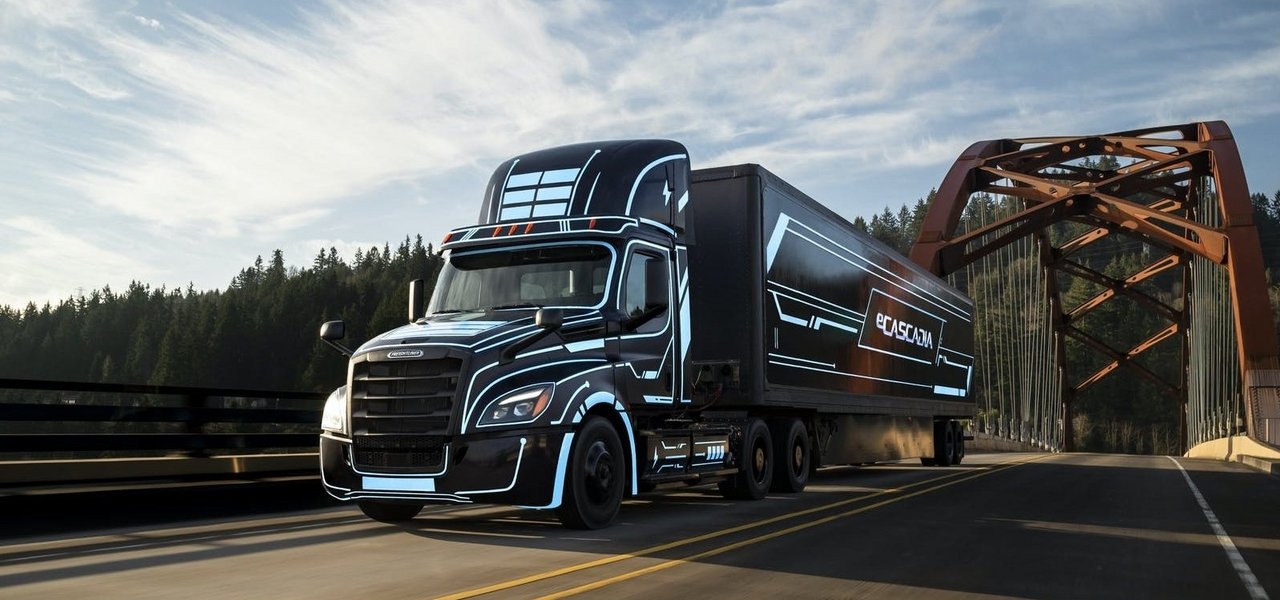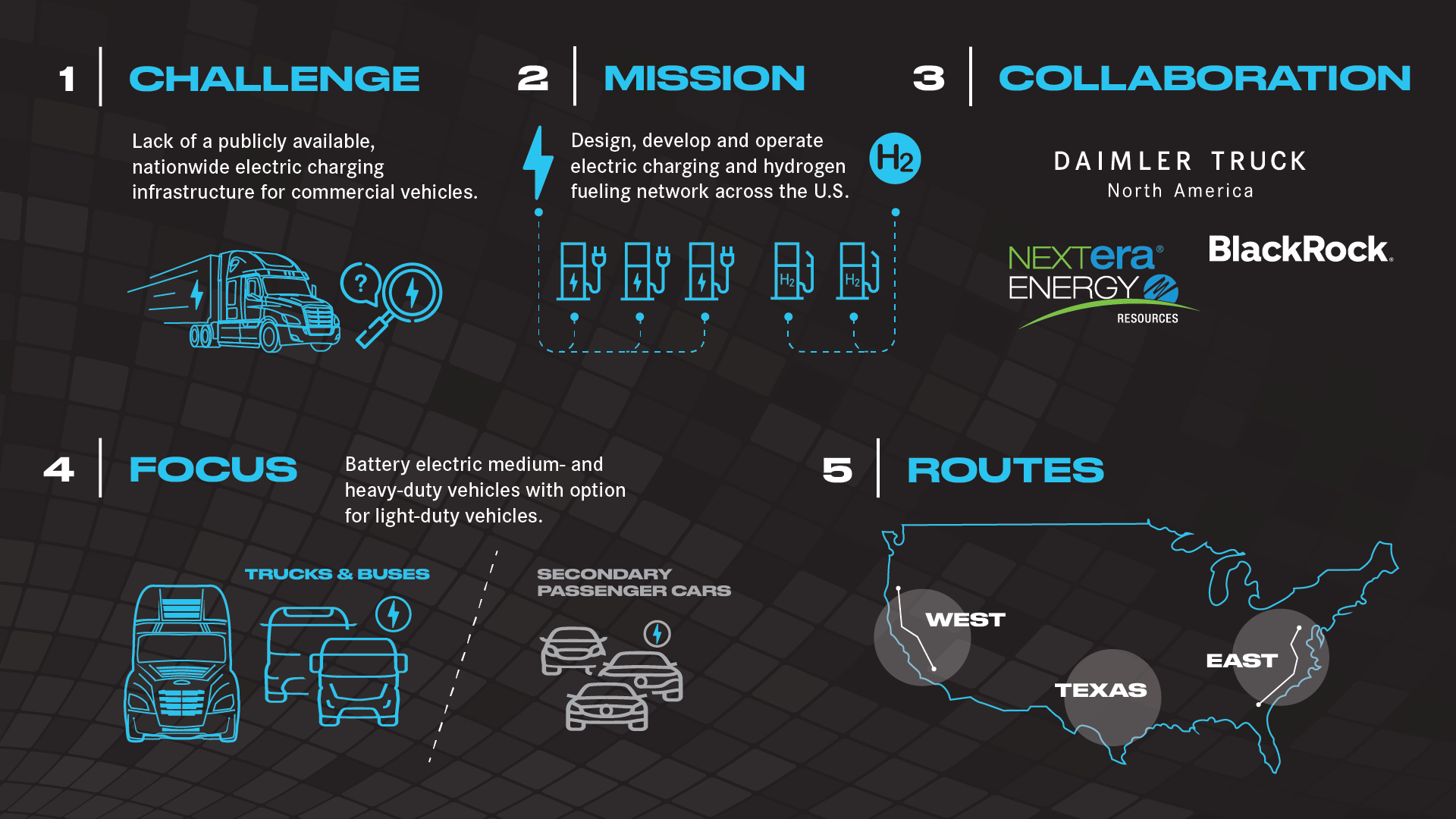31. Januar 2022 - Daimler Truck North America, NextEra Energy Resources and BlackRock Renewable Power Announce Plans To Accelerate Public Charging Infrastructure For Commercial Vehicles Across The U.S.

Joint Venture for public charging infrastructure in the U.S.
Daimler Truck North America LLC (DTNA), NextEra Energy Resources, LLC and BlackRock Renewable Power (BlackRock) today announced that they have signed a Memorandum of Understanding (MOU) to lay the foundation for a proposed joint venture (JV) to design, develop, install and operate a nationwide, high-performance charging network for medium- and heavy-duty battery electric and hydrogen fuel cell vehicles in the U.S. With the goal of accelerating the rollout of carbon-neutral freight transportation, start of operations for the future JV is planned for 2022. Initial funding is expected to be comprised of approximately $650 million divided equally among the three parties.
Lack of a publicly available, nationwide electric charging infrastructure for commercial vehicles, especially those used for long-haul freight operations, remains one of the biggest barriers for widespread deployment of electric trucks. With formation of this JV, the three parties will be pooling their resources to address this challenge. The parties plan to build a network of charging sites on critical freight routes along the east and west coasts and in Texas by 2026, leveraging existing infrastructure and amenities while adding complementary greenfield sites to fulfill anticipated customer demand. First phase is set to begin construction in 2023.
Initial focus will be on battery electric medium- and heavy-duty vehicles followed by hydrogen fueling stations for fuel cell trucks; the sites will also be available for light-duty vehicles to serve the greater goal of electrifying mobility.
The proposed JV will benefit from the broad experience and knowledge of its founding members. NextEra Energy Resources, the world’s largest generator of renewable energy from the wind and sun, is also a significant investor in electric and charging infrastructure and brings experience optimizing renewable energy, resiliency and grid integration. DTNA offers the expertise of developing electric trucks (start of production of battery electric Freightliner eCascadia and eM2 in 2022/23), walk-in vans and school buses, and the experience of providing consultant services to its customers, the nation’s fleet operators. In cooperation with the local utility company Portland General Electric (PGE), DTNA opened the first-of-its-kind public charging site for commercial vehicles in the U.S. BlackRock’s Renewable Power group is one of the largest renewable power equity investment platforms in the world. The group seeks to invest across the spectrum of renewable power and energy transition supporting infrastructure globally, with over $9.5 billion in total commitments and investments in over 350 wind and solar projects, in addition to electric vehicle charging infrastructure and battery energy storage systems, across 15 countries and 5 continents. BlackRock’s Renewable Power group is a part of BlackRock Real Assets.
John O’Leary, president and CEO DTNA, said: “This planned joint venture, and our collaboration with Black Rock and NextEra Energy Resources, will address the urgent need for a nationwide battery electric and hydrogen fuel charging infrastructure for commercial vehicles to reach shared climate goals. Our joint investment will act as a catalyst to make a carbon-neutral trucking industry a reality. This project is a critical step toward developing a sustainable ZEV ecosystem across North America, and we look forward to including additional partners as it progresses. We are committed to providing access to this network not only for the DTNA vehicle brands, but also for any manufacturers using predominant industry charging standards and communication protocols.”
“Working with Daimler Truck North America and BlackRock, we expect to accelerate the transformation of the transportation sector and make future investments in electrification upgrades, charging stations and renewables“, said John Ketchum, president and CEO, NextEra Energy Resources. “This collaboration builds on our market-leading eIQ Mobility software platform for quantifying the value and timing of fleet conversions and our decarbonization-as-a-service platform that help fleets execute on their plans to transition to zero emission electric and hydrogen vehicles.“
David Giordano, Global Head of BlackRock’s Renewable Power Group, said, “The commercial transportation sector is a significant contributor to carbon emissions and we firmly believe that decarbonization of transportation will be a critical societal focus for the next decade. Having already made several investments in the EV charging infrastructure space around the globe, we also believe that investments in the sector are highly complementary to our renewable power generation investment strategy. We are pleased to collaborate with NextEra Energy Resources and Daimler Truck North America on this proposed joint venture, which has the potential to provide our clients with access to compelling opportunities that support the energy transition.”

-
About Daimler Truck North America
Daimler Truck North America LLC, headquartered in Portland, Oregon, is a leading provider of comprehensive products and technologies for the commercial transportation industry. Daimler Truck North America designs, engineers, manufactures and markets medium- and heavy-duty trucks, school buses, vehicle chassis and their associated technologies and components under the Freightliner, Western Star, Thomas Built Buses, Freightliner Custom Chassis Corp and Detroit brands. Daimler Truck North America is a subsidiary of Daimler Truck Holding AG (DTG), one of the world’s leading commercial vehicle manufacturers. For more information, visit www.daimler-trucksnorthamerica.com.
-
About Nextera Energy Resources
NextEra Energy Resources, LLC (together with its affiliated entities, “NextEra Energy Resources”) is a clean energy leader and is one of the largest wholesale generators of electric power in the U.S., with approximately 23,900 megawatts of total net generating capacity, primarily in 38 states and Canada as of year-end 2020. NextEra Energy Resources, together with its affiliated entities, is the world's largest generator of renewable energy from the wind and sun based on 2020 megawatt hours produced on a net generation basis, and a world leader in battery storage. The business operates clean, emissions-free nuclear power generation facilities in New Hampshire and Wisconsin as part of the NextEra Energy nuclear fleet. NextEra Energy Resources, LLC is a subsidiary of Juno Beach, Florida-based NextEra Energy, Inc. (NYSE: NEE). For more information, visit www.NextEraEnergyResources.com.
-
About BlackRock Real Assets
In today’s dynamic and complex global investing market, BlackRock Real Assets seeks to help clients access real assets that could help meet their investment goals by providing a distinct range of well defined, outcome orientated strategies, along the investment risk-return spectrum. BlackRock Real Assets’ dedicated teams of industry and sector specialists deliver global reach, with deep local expertise. They have decades of relevant experience, are deeply embedded in their operating industries by sector and geography and have developed strong partnership networks over time. BlackRock’s culture of risk management, knowledge sharing and investment discipline sets BlackRock Real Assets apart and underpins all that they do. With over 400 professionals in 30 offices managing over $65 billion in client commitments as of September 30, 2021, BlackRock Real Assets partners with clients to provide solutions tailored to individual portfolio needs such as income, growth, liquid, or balanced real assets outcomes.
Forward-looking statements:
This document contains forward-looking statements that reflect our current views about future events. The words “anticipate,” “assume,” “believe,” “estimate,” “expect,” “intend,” “may,” ”can,” “could,” “plan,” “project,” “should” and similar expressions are used to identify forward-looking statements. These statements are subject to many risks and uncertainties, including an adverse development of global economic conditions, in particular a decline of demand in our most important markets; a deterioration of our refinancing possibilities on the credit and financial markets; events of force majeure including natural disasters, pandemics, acts of terrorism, political unrest, armed conflicts, industrial accidents and their effects on our sales, purchasing, production or financial services activities; changes in currency exchange rates, customs and foreign trade provisions; a shift in consumer preferences towards smaller, lower-margin vehicles; a possible lack of acceptance of our products or services which limits our ability to achieve prices and adequately utilize our production capacities; price increases for fuel or raw materials; disruption of production due to shortages of materials, labor strikes or supplier insolvencies; a decline in resale prices of used vehicles; the effective implementation of cost-reduction and efficiency-optimization measures; the business outlook for companies in which we hold a significant equity interest; the successful implementation of strategic cooperations and joint ventures; changes in laws, regulations and government policies, particularly those relating to vehicle emissions, fuel economy and safety; the resolution of pending government investigations or of investigations requested by governments and the conclusion of pending or threatened future legal proceedings; and other risks and uncertainties, some of which are described under the heading “Risk and Opportunity Report” in the Prospectus. If any of these risks and uncertainties materializes or if the assumptions underlying any of our forward-looking statements prove to be incorrect, the actual results may be materially different from those we express or imply by such statements. We do not intend or assume any obligation to update these forward-looking statements since they are based solely on the circumstances at the date of publication.